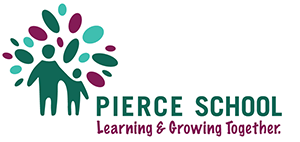Health Services - by Pierce Nurse, Mary D'Amore
-
Dear Pierce Parents and Guardians,
School is officially in full swing, and so is the beginning of the cold and flu season! We are hoping for a healthy school year, and would like to remind you of a few ways you can teach your children to protect themselves from the germs that cause colds, stomach bugs, bacterial infections, and the flu. One way, is to master the art of good hand washing. Another is to learn cough and sneeze etiquette. Please share these ideas with your children! You can find the links on how to learn these techniques by going to the Pierce PTO Website. Please feel free to contact us at 617.730.2584, if you have questions or concerns.
Advice for Parents:
- Wash hands often with soap and water for 20 seconds
- Avoid touching eyes, nose and mouth with unwashed hands
- Avoid kissing, hugging, sharing cups or eating utensils with people who are sick
- Disinfect frequently touched surfaces, such as toys, doorknobs, computer keyboards, especially if someone is sick.
Thank you for your cooperation!
Medication Policy
Medication Procedures in School
Essential medications may be administered during the school day to ensure that students may attend school. Parent/guardian consent and physician’s orders are required for the administration of all medications, prescription and non-prescription. Faxed orders will be accepted if received directly from the prescriber’s office.
Non-prescription Over the Counter Medications
Standing orders from the school physician are on file for several commonly used over the counter (OTC) medications, such as Tylenol and Ibuprofen. Parent/guardian may elect, by signing permission on the Health and Emergency Information card, for the nurse to administer these medications.
Daily Medications: Short Term
All medications must be in a prescription/pharmacy labeled container and brought to the nurse by the parent/guardian, who will complete and sign a medication administration plan.
Daily Medications: Long Term
All medications, including emergency meds, must be in the prescription/pharmacy labeled container and accompanied by a physician’s order and a medication administration plan completed by both parent/guardian,
Field Trips
School nurses are rarely present on field trips. When no nurse is present on field trips a staff member trained by the nurse will administer essential medications if permitted by Department of Public Health regulations. Epipens may be administered to a student with known allergies if the staff member is properly trained. Students may carry and self administer their own medications such as inhalers for asthma and in some cases Epipens, if determined to be age appropriate and safe.
For more information refer to https://www.brookline.k12.ma.us. Go to School Committee. Click on policy and refer to Support Services E.2b. Medication Administration Policy
-
When to keep your child home from school for illness
Parents frequently ask for guidelines for when to keep their children home with illnesses. Most germs have already been shared in the day or two before your child is feeling ill; therefore whether your child stays home will depend on their ability to carry on during the school day, and the impact their illness has on the other student’s health and learning in the classroom.
COLD (Upper Respiratory Illness): If your child has a constantly runny nose and lots of sneezing and coughing, and/or a mild sore throat, keep your child home until these symptoms lessen, usually 24 to 48 hours. Children with mild cold symptoms may attend school.
FEVER: If your child has a temperature of 100 degrees or more (UNMEDICATED), keep your child home until 24 hours after the temperature returns to normal, without any medication. (i.e.Tylenol, Acetaminophen, Motrin, Ibuprofen, Aleve.)
FEVER and RESPIRATORY SYMPTOMS: If your child has a fever of 100 degrees, and a runny or stuffy nose, cold and/or cough, sore throat. PLEASE keep your child home and consult your pediatrician. Notify your school nurse.
VOMITING AND/OR DIARRHEA: If your child has vomiting or diarrhea, keep your child home until 24 hours after the last episode. In certain illness outbreaks, the amount of time before a student can return may increase to 72 hours. You will be notified of change.
CHICKEN POX: Vaccinated children have a small chance of having "break through" chicken pox. Notify your primary care provider if you think your child has chicken pox. Notify the school nurse. For a suspected case of chicken pox, keep your child home until all the scabs are crusty and dry, or there has been a medical diagnosis of another cause of the rash.
TAKING MEDICATION: When your primary care provider prescribes antibiotics for Strep Throat, Bacterial Conjunctivitis, or Impetigo, keep your child at home until s/he has taken at least 24 hours of medication. Call the school nurse before your child returns to school.
RASH: If your child has an undiagnosed rash, keep your child home. Call your child's primary care provider and inform the school nurse. Once diagnosed, please consult the school nurse before sending your child back to school.
SKIN FUNGUS: If your child has a skin fungus (ringworm), keep your child home and contact your primary care provider. Your child may return to school if the ringworm is small and in a covered area. For exposed ringworm, your child may return to school after 24 hours of using the recommended medication. If possible, the affected area covered should be covered.
DENTAL: Please do not bring your child back to school until bleeding has stopped and pain is manageable after extraction or fillings.
SHOULD YOUR CHILD NEED TO BE ABSENT FROM SCHOOL, please call the ABSENCE LINE 617.730.2572. If illness related, please leave the reason, so we might identify outbreaks of contagious illnesses.
Thank You!


